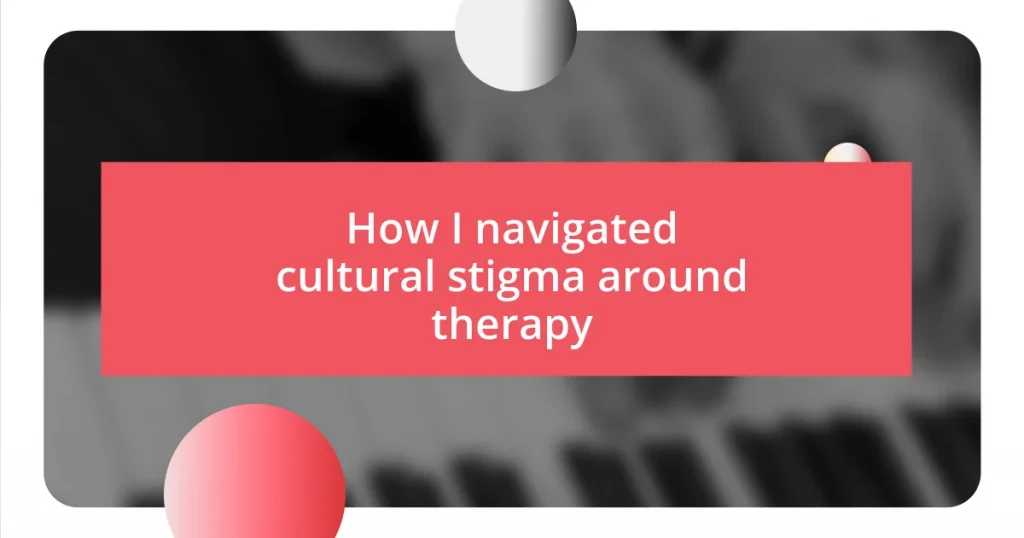Key takeaways:
- Cultural stigma often presents seeking therapy as a weakness, but acknowledging vulnerability can signify strength and promote healing.
- Breaking the silence about mental health can inspire open conversations, creating community and encouraging others to seek help.
- Implementing coping strategies like mindfulness and journaling empowers individuals, aiding in the journey toward mental wellness and resilience.
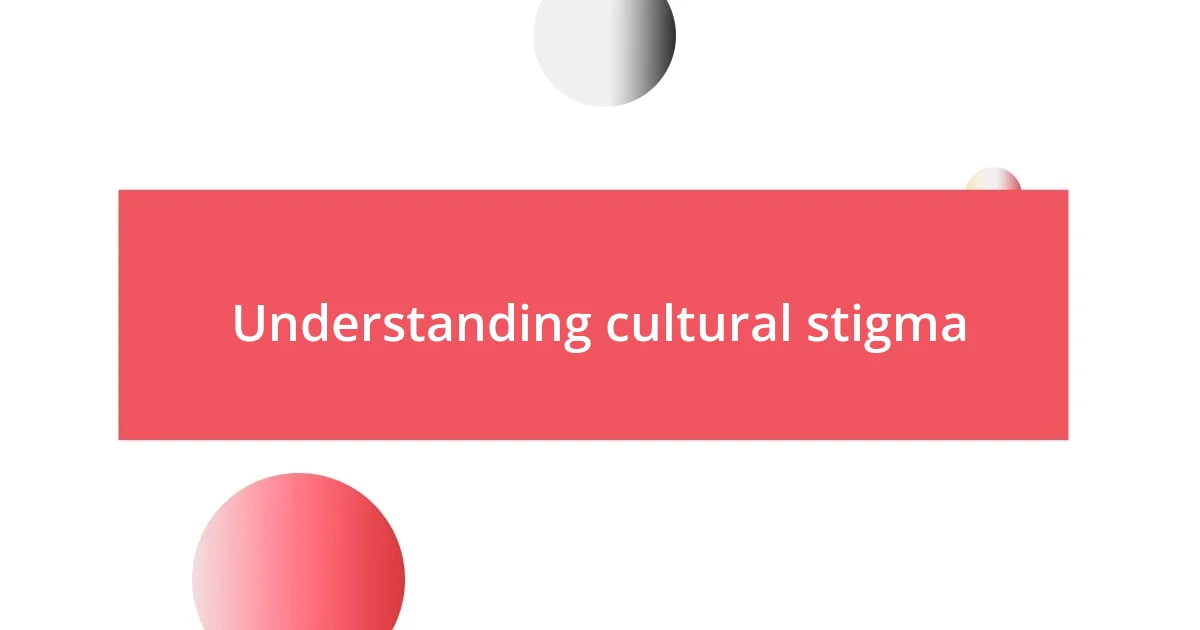
Understanding cultural stigma
Cultural stigma around therapy often stems from deep-rooted beliefs that equate seeking help with weakness. I remember the moment I first confided in a friend about my struggles. Their eyes widened, and they exclaimed, “You? In therapy? What’s wrong with you?” That reaction struck me; it made me question if I was doing something inherently shameful.
In many communities, mental health issues are swept under the rug, treated as a taboo rather than a normal part of life. Reflecting on my upbringing, I realize there was a pervasive message that resilience meant solving problems independently. But I wondered, isn’t it a strength to ask for guidance? This thought nudged me toward the realization that vulnerability can coexist with strength.
Additionally, the portrayal of therapy in popular media can perpetuate misunderstandings. For instance, I often noticed how characters seeking therapy were depicted as flawed or “crazy.” That made me apprehensive about pursuing my own healing journey. Have you ever felt a similar hesitation? It can be eye-opening to recognize how these impressions shape our views and inform our decisions.
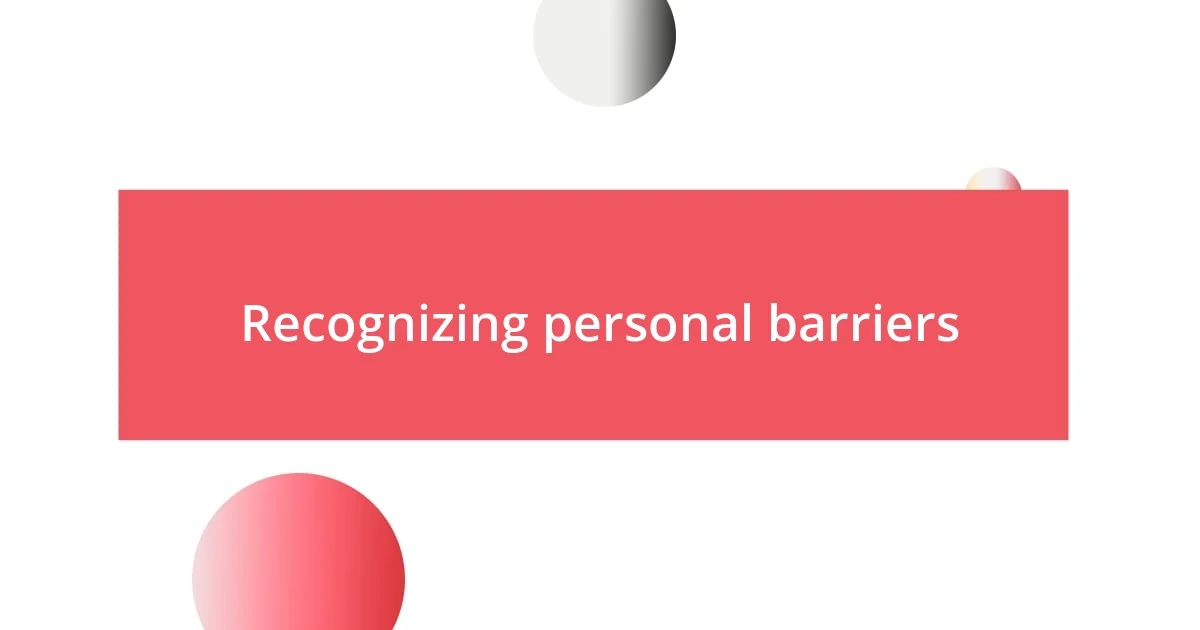
Recognizing personal barriers
Recognizing personal barriers often requires an honest assessment of one’s fears and misconceptions. I remember grappling with my self-doubt when considering therapy. The internal dialogue was relentless: “What will people think of me?” It took time for me to understand that those judgments were more reflective of cultural stigma than my actual worth.
Another barrier was my belief that I simply needed to “toughen up.” I thought that admitting I needed help would mean I had failed in some way. Reflecting on past experiences, especially during tough times, changed my perspective. I realized that even the strongest individuals occasionally need support. Has that thought crossed your mind as well? Recognizing that seeking therapy doesn’t equate to weakness is a crucial step toward overcoming such barriers.
Finally, I confronted the misconception that therapy was only for those in crisis. This led to a powerful realization: mental health should be a priority at all times, not just during traumatic moments. I began shifting my mindset from seeing therapy as a last resort to viewing it as a proactive measure for overall well-being. This change in thinking opened up a world of possibilities for growth and healing.
| Personal Barrier | My Reflection |
|---|---|
| Fear of judgment | People’s opinions often clouded my view of therapy. |
| Belief in self-reliance | I equated help with failure, a mindset that needed offloading. |
| Therapy as a crisis tool | Realizing it’s a proactive choice shifted my approach entirely. |
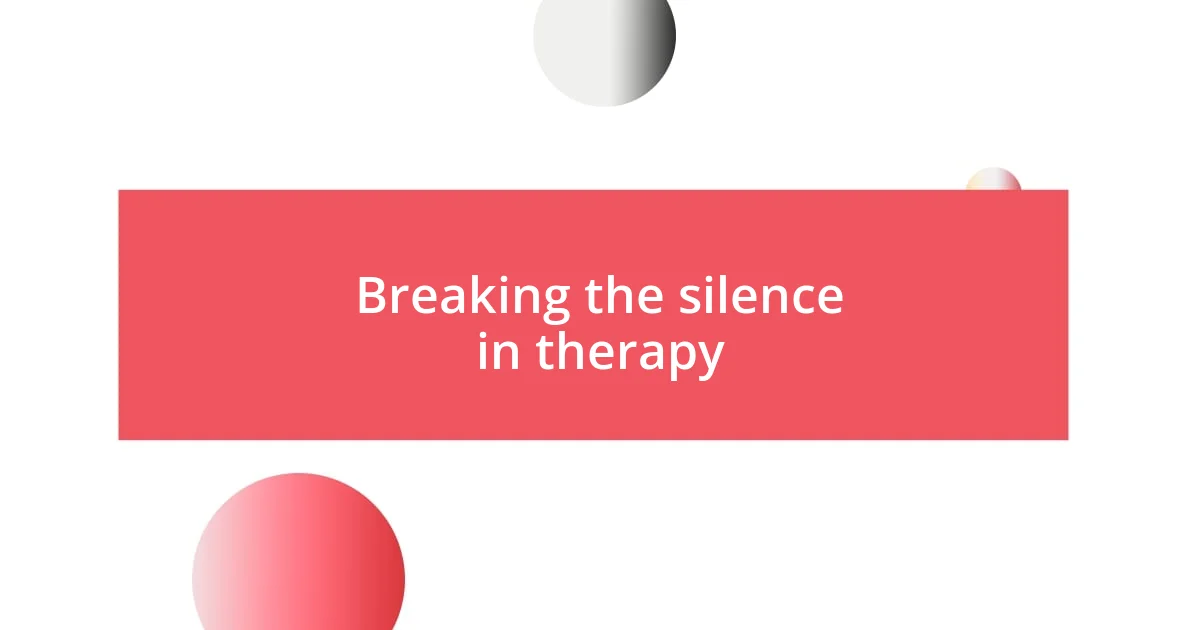
Breaking the silence in therapy
Breaking the silence in therapy can feel like standing on the edge of a cliff, ready to jump into something unknown. I recall attending a gathering where mental health was briefly touched upon. The room fell mute, and I felt a wave of urgency to fill that empty space with dialogue. I took a deep breath and shared my own experience, which caught the attention of others. What amazed me was how many people were waiting for someone to speak up. It was almost as if my words cracked open a dam of unspoken thoughts.
- Being vulnerable can create a safe space for others.
- Sharing our stories helps dismantle the stigma.
- Talking about therapy can normalize seeking help.
In my experience, breaking that silence is about inviting connection. One day, I invited a close friend to grab coffee and, out of the blue, I asked, “Have you ever thought about therapy?” The response surprised me—she shared her hesitation and fears, making me realize how many of us carry similar unspoken worries. Conversations like this can illuminate just how many people are silently seeking support. It reinforces an important truth: our stories, when shared, have the power to weave a tapestry of understanding and acceptance among us.
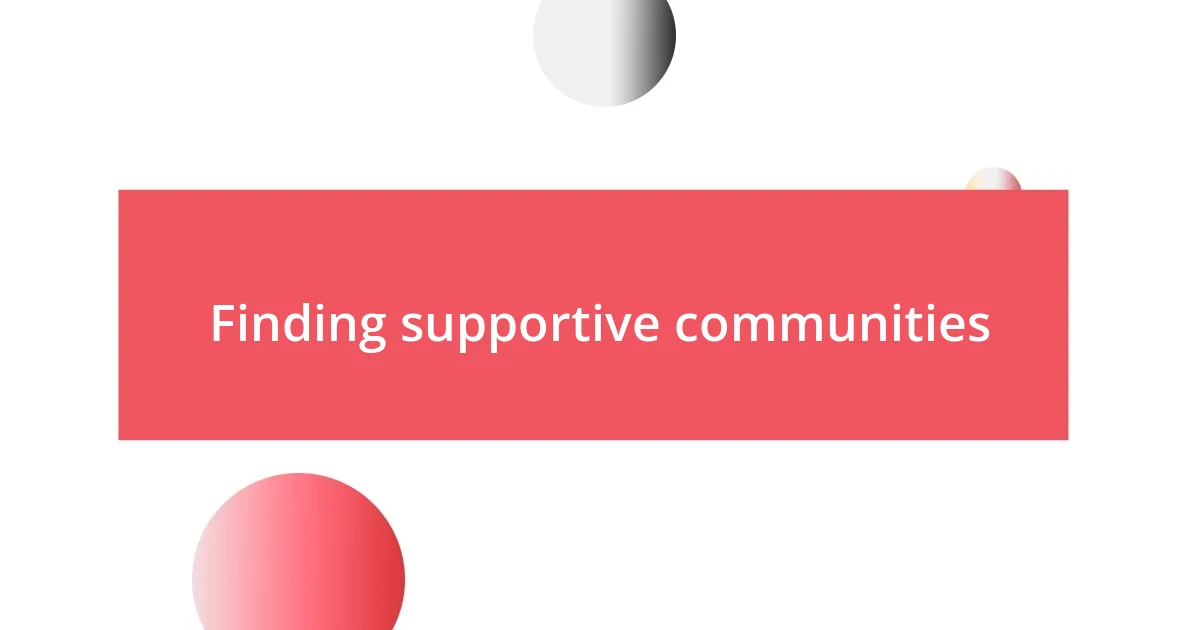
Finding supportive communities
Finding supportive communities has been transformative for my journey. I vividly recall the moment I stepped into a local mental health support group for the first time—my heart raced as I scanned the room filled with strangers. But as I listened to their stories, I marveled at how similar our struggles were. Hasn’t everyone felt like an outsider at some point? This realization brought me an unexpected sense of belonging.
Engaging with supportive communities isn’t just about sharing experiences; it’s also about creating a safe environment where vulnerability is welcomed. I remember attending a workshop where we were encouraged to write letters to our past selves. Re-reading my own words made me feel seen and understood by others who resonated with my journey. Community support can help lighten the weight of our experiences. Isn’t it incredible how shared stories can unite us?
In my experience, finding those like-minded individuals often requires active searching, and sometimes stepping out of your comfort zone. I joined an online forum dedicated to mental health, and I was amazed by the openness of people sharing both victories and defeats. Conversations that used to make me anxious became invigorating, reinforcing the idea that I wasn’t alone in this fight. Building those connections taught me the value of community—a lesson I now cherish deeply. What if the key to thriving lies in the connections we forge with each other?
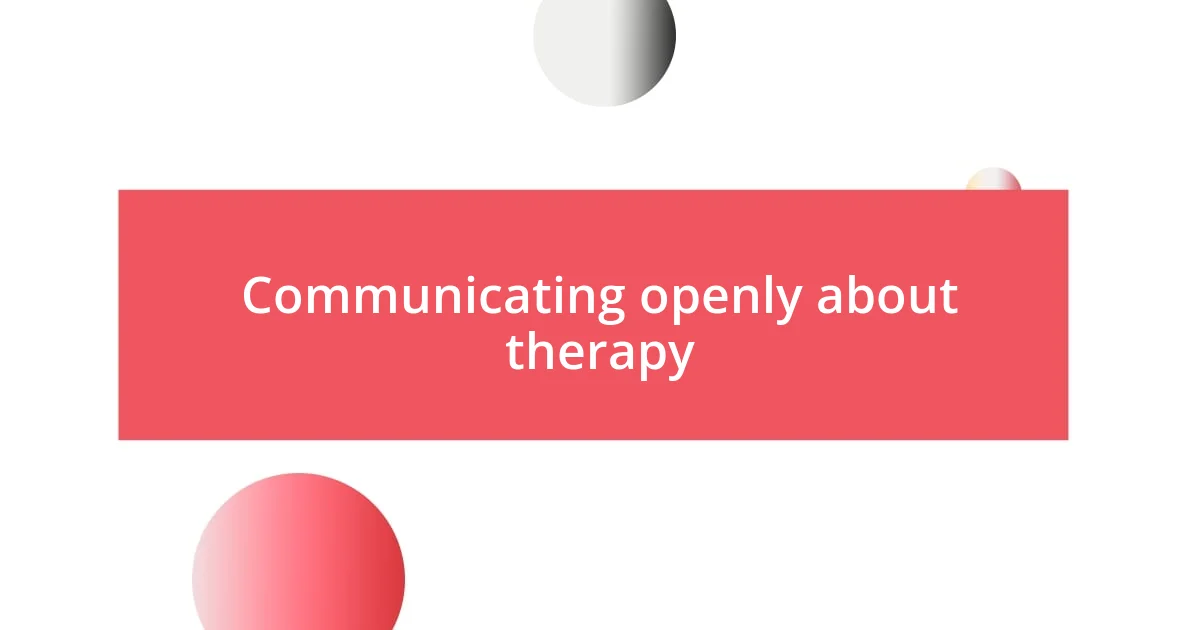
Communicating openly about therapy
Communicating openly about therapy can feel daunting, yet it’s one of the most liberating experiences I’ve encountered. I recall a conversation with a friend who initially dismissed therapy as “not for people like us.” I decided to share how therapy had transformed my views on mental health. The moment I saw her curiosity spark, I realized that honesty can open doors to deeper understanding.
When I chose to discuss my experiences in therapy, it felt like peeling back layers of a protective shell. I remember sitting with my brother one evening, casually discussing our week, and nervously broaching the topic of my therapist. His surprise was palpable, with a hint of relief in his voice as he confessed, “I didn’t know it was okay to talk about this.” That moment reminded me that many of us are waiting for permission to share, and just one conversation can be the catalyst for someone else to seek help.
How can we expect to change perceptions if we don’t start the dialogue? Every time I step forward and talk about therapy, I feel a weight lift—not just from my own shoulders but also from those around me. It’s the simple act of sharing that lights the way for others to explore their own paths to healing. Experiences like these make me wonder: why does it feel so risky to talk about something that could ultimately save lives?
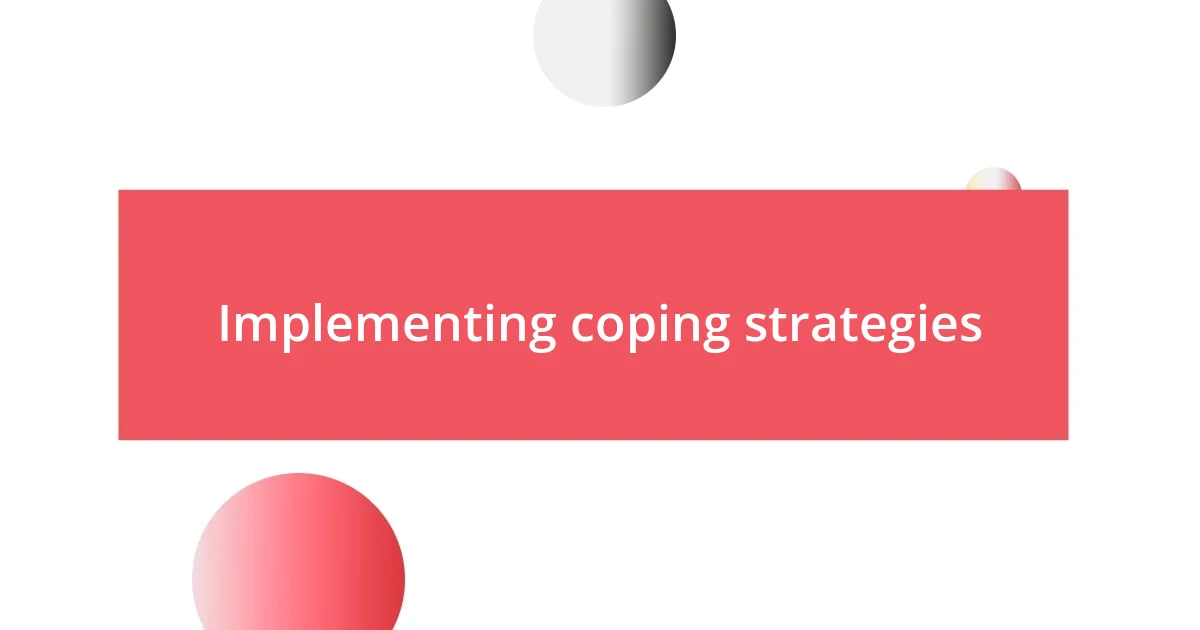
Implementing coping strategies
Implementing coping strategies has been a game changer for me in navigating cultural stigma around therapy. One memorable moment was when I discovered mindfulness meditation. Initially, I was skeptical—sitting alone in silence felt intimidating. But after just a few sessions, I noticed how these moments of stillness disrupted the chaotic thoughts that often cloud my mind. Hasn’t anyone else experienced that overwhelming swirl of anxiety? Learning to ground myself has given me a toolkit to counter those feelings when they arise.
Incorporating journaling into my daily routine also proved invaluable. I remember one evening, feeling particularly overwhelmed, I sat down and poured my thoughts onto the pages. Then, as I read back through my entries, I recognized patterns in my emotions that I hadn’t noticed before. This practice not only helped clarify my feelings but also revealed how I could address the underlying issues. Didn’t you ever wonder how writing could unpack the clutter in your mind?
Finding healthy outlets like exercise has been transformative for my mental health. I still vividly remember that first jog in the park; my legs felt heavy, and my breath was short, but with every step, I shed pieces of my anxiety. There’s something so freeing about movement—it’s as if I’m releasing the tension built up inside. Reflecting on that experience makes me realize: when we invest energy into coping strategies, we not only reclaim our mental space but also our joy. What could be more empowering than taking control of our own healing?
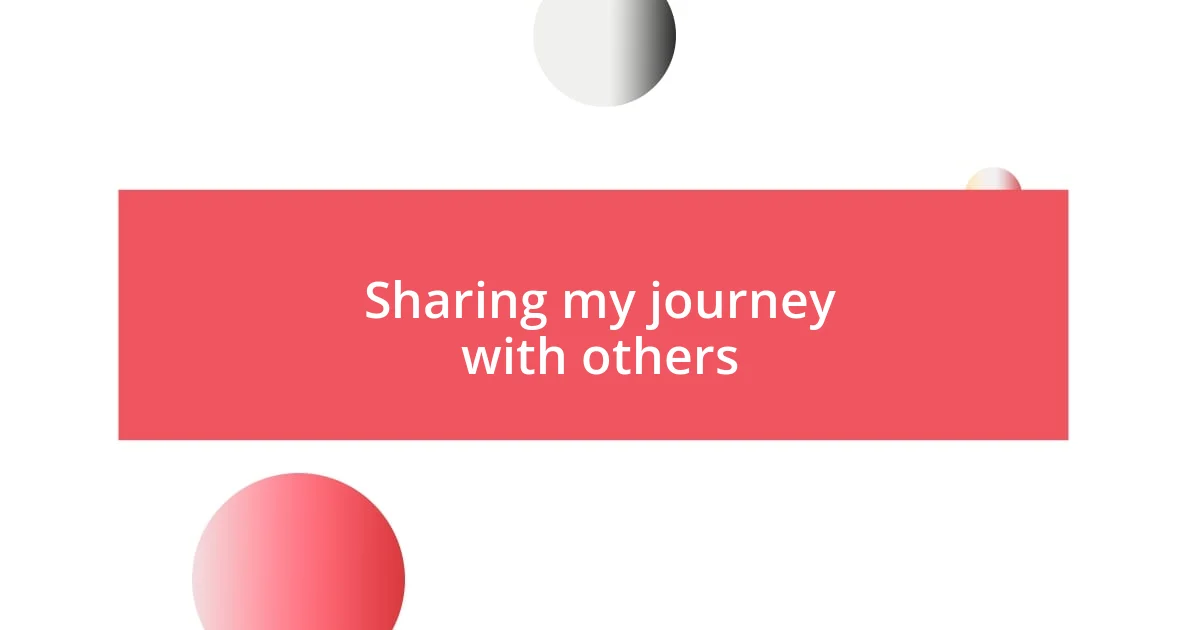
Sharing my journey with others
Sharing my journey has not only been cathartic for me, but it has also encouraged others to open up. Recently, while chatting with a coworker over coffee, I shared a particularly tough moment from therapy that had helped reshape my understanding of vulnerability. Her response was one of surprise followed by a thoughtful nod; she later confided that she, too, had been grappling with similar fears about seeking help. Isn’t it fascinating how shared experiences can forge unexpected connections?
I also remember a small gathering where I decided to share the story of my journey with therapy. As I spoke, I noticed a shift in the room—people leaned in, their usual chatter quieted. It was as if my words gave them permission to reflect on their own struggles. One friend approached me afterward and said, “Hearing you talk about it made me realize that it’s not just me.” This made me think about the ripple effect our stories can have. When we share, we may find that we’re not alone in our experiences.
Every time I recount my experiences, I feel a blend of pride and apprehension. It’s a reminder that breaking the silence around mental health is never easy, but it’s necessary. Have you ever felt that rush of anxiety before sharing something deeply personal? I have, and yet, the relief that follows is unparalleled. Sharing my journey has transformed not just me but also those around me, turning stigma into a space for empathy and growth.










